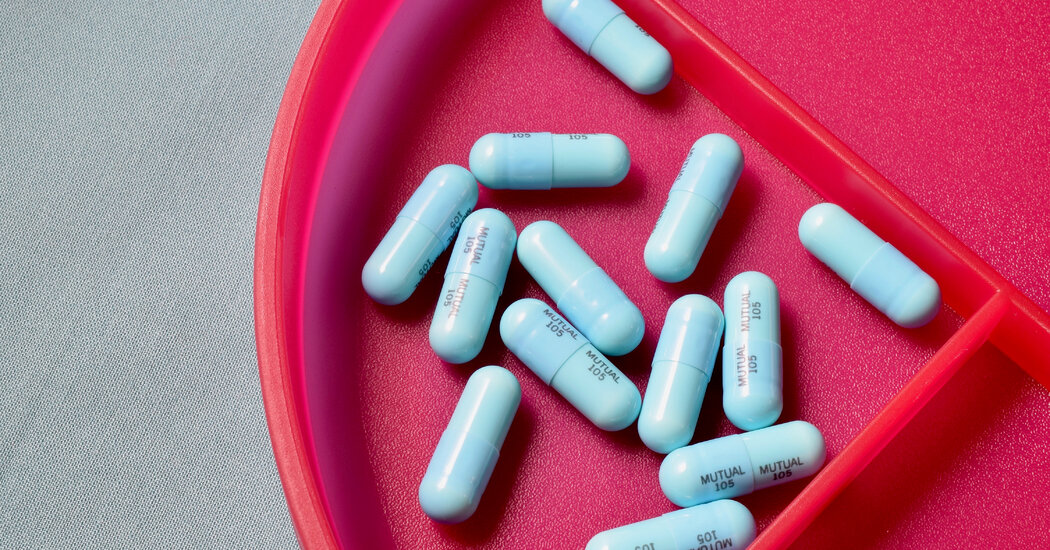Infection
What to Know About the ‘Morning-After’ Pill for S.T.I.s
Doxycycline can help prevent sexually transmitted infections. Here’s how to use it.
As sexually transmitted infections continue to climb in the United States, a promising tool to combat them is drawing more attention. This week, the Centers for Disease Control and Prevention released a draft proposal to recommend the antibiotic doxycycline as a “morning-after” pill to help prevent chlamydia, syphilis and gonorrhea infections among people at especially high risk.
“This is a huge game-changer for our field,” said Dr. Sonali Kulkarni, medical director of the Division of H.I.V. and S.T.D. Programs at the Los Angeles County Department of Public Health.
Some clinics around the country have started using the drug, which is already widely used to treat many conditions, to curb S.T.I.s. Here’s what to know about doxycycline, called DoxyPEP when taken after exposure, and how to use it.
Who should take doxycycline? And when?
The C.D.C. draft guidelines, based on available data on the groups at highest risk of developing an S.T.I., only recommend the medication for men who have sex with men and for transgender women who have had a bacterial S.T.I. in the last year or who are otherwise at increased risk.
“We don’t want to offer it across the board to anyone who might have a sexual encounter that’s fairly low risk,” said Dr. Kaiyti Duffy, chief medical officer at the Los Angeles LGBT Center, which offers the medication. Taking antibiotics frequently could make bacteria resistant to the drugs, said Dr. Jenell Stewart, an infectious disease physician at the University of Minnesota and Hennepin Healthcare.
“We’re saying, let’s just limit to people we suspect will benefit from it the most, to make sure we’re not overusing antibiotics,” Dr. Stewart said. “That’s part of the caution, making sure we have evidence that the benefits will outweigh the risks.”
Still, some doctors may prescribe it to others at risk of an S.T.I., Dr. Kulkarni said. At this point, though, there isn’t enough evidence to broadly recommend the medication for other groups, such as cisgender women. Experts also said pregnant people should not take doxycycline; research suggests it may negatively impact a fetus.
Those at risk should keep doxycycline on hand, as a “pill in pocket,” said Dr. Annie Luetkemeyer, an infectious disease physician at Zuckerberg San Francisco General Hospital and Trauma Center. They should take a dose within 72 hours of sex without a condom, including oral and anal sex, and the sooner someone takes it, the better.
How effective is doxycycline?
The treatment is considered very effective at preventing chlamydia and syphilis, but may be less effective against gonorrhea; protection against gonorrhea may vary because some strains are resistant to doxycycline, said Dr. Stewart.
The medication is not 100 percent effective against bacterial S.T.I.s, and also can’t protect against viral S.T.I.s such as herpes, Mpox, H.I.V. and H.P.V.
“The goal is not to give this to everyone instead of condoms,” Dr. Luetkemeyer said. “It’s meant to be an additional tool — because clearly, we need additional tools.”
What are the side effects and risks?
The most common side effect of doxycycline is nausea, Dr. Stewart said. Some people become more prone to sunburns, and so patients should wear sunscreen while on the medication.
Can I take doxycycline if I’m on PrEP?
Yes, you can take it alongside the H.I.V. prevention treatment.
How often can I take it?
You should not take the medication more than once in a 24-hour period, but you can take doxycycline multiple days in a row. “If they’re having sex every day, they can take it every day,” said Dr. Hyman Scott, medical director of the San Francisco AIDS Foundation.
There are risks to frequent antibiotic use, Dr. Stewart said. But when someone has just been exposed to bacteria like the type that causes chlamydia, “blasting” a few bacteria with a single dose of antibiotics could prevent it from becoming an infection, she said. “That’s why it’s OK to use a small amount” intermittently, Dr. Stewart said.
I took doxycycline. Should I still get tested for S.T.I.s?
Get screened every three to six months, even if you take the medication, said Dr. Taimur Khan, associate medical research director at Fenway Health, and keep an eye out for symptoms such as fever, discharge, painful urination and full body rashes. If you have symptoms, get tested sooner.
Where can I find it, and how much does it cost?
Doctors recommend talking to your primary care provider or seeking out an S.T.I. clinic or L.G.B.T.Q. health center. Many health plans cover doxycycline, and even without insurance, it costs around $24 for 20 tabs, Dr. Khan said.
The C.D.C. will review comments from the public before finalizing its recommendation, which doctors said could be a critical step to bring down the rising rates of S.T.I.s nationwide.
“We have this drug already, which is generic and safe,” Dr. Khan said. “Why are we not doing this more readily?”

